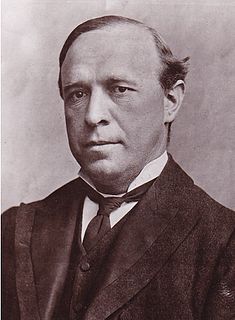
Pacifism is opposition to war, militarism, or violence. The word pacifism was coined by the French peace campaigner Émile Arnaud (1864–1921) and adopted by other peace activists at the tenth Universal Peace Congress in Glasgow in 1901. A related term is ahimsa, which is a core philosophy in Hinduism, Buddhism, and Jainism. While modern connotations are recent, having been explicated since the 19th century, ancient references abound.
A conscientious objector is an "individual who has claimed the right to refuse to perform military service" on the grounds of freedom of thought, conscience, or religion.

Emily Greene Balch was an American economist, sociologist and pacifist. Balch combined an academic career at Wellesley College with a long-standing interest in social issues such as poverty, child labor, and immigration, as well as settlement work to uplift poor immigrants and reduce juvenile delinquency.

Archibald Fenner Brockway, Baron Brockway, was a British anti-war activist and politician.

Waldo (Goronwy) Williams was one of the leading Welsh-language poets of the 20th century. He was also a notable Christian pacifist, anti-war campaigner, and Welsh nationalist.
Archibald McColl Learmond Baxter was a New Zealand socialist, pacifist and conscientious objector.
The Central Committee for Conscientious Objectors (CCCO) was a United States nonprofit organization dedicated to helping people avoid or resist military conscription or seek discharge after voluntary enlistment. It was active in supporting conscientious objectors ("CO's"), war resisters and draft evaders during the Vietnam War. Founded in Philadelphia in 1948 and dissolved in 2011, CCCO emphasized the needs of secular and activist COs, while other organizations supporting COs principally focused on religious objectors and/or legislative reform and government relations.
Conscientious objection to military taxation (COMT) is a legal theory that attempts to extend into the realm of taxation the concessions to conscientious objectors that many governments allow in the case of conscription, thereby allowing conscientious objectors to insist that their tax payments not be spent for military purposes.
South African resistance to war has a long tradition, and a history that includes conscientious objectors, pacifists, deserters and draft dodgers, as well as those whose objections are based upon the notion of "just war" as opposed to unjust or illegal war.

William Llewelyn Williams known as Llewelyn Williams, was a Welsh journalist, lawyer and radical Liberal Party politician.

Opposition to World War I included socialist, anarchist, syndicalist, and Marxist groups on the left, as well as Christian pacifists, Canadian and Irish nationalists, women's groups, intellectuals, and rural folk. Women across the spectrum were much less supportive than men.
George Maitland Lloyd Davies, born George Maitland Temple Davies, was a Welsh pacifist and Member of Parliament for the University of Wales constituency.

Alice Ann Wheeldon was a British supporter of women's suffrage and anti-war campaigner. She was convicted in 1917, along with her daughter, Winnie, and son-in-law, Alfred Mason, of conspiracy to murder the Prime Minister, David Lloyd George. At least some of the evidence given in the case against them appears to have been fabricated on behalf of "a government eager to disgrace the antiwar movement".
Osman Murat Ülke is a Turkish conscientious objector. He was imprisoned for two and a half years for refusal of military service, and was the subject of a ruling from the European Court of Human Rights.

The No-Conscription Fellowship was a British pacifist organization which was founded in London by Fenner Brockway and Clifford Allen on 27 November 1914, after the First World War had failed to reach an early conclusion. Other prominent supporters included John Clifford, Bruce Glasier, Bertrand Russell, Robert Smillie and Philip Snowden.
A construction soldier was a non-combat role of the National People's Army, the armed forces of the German Democratic Republic, from 1964 to 1990. Bausoldaten were conscientious objectors who accepted conscription but refused armed service and instead served in unarmed construction units. Bausoldaten were the only legal form of conscientious objection in the Warsaw Pact.
The Non-Combatant Corps (NCC) was a corps of the British Army composed of conscientious objectors as privates, with NCOs and officers seconded from other corps or regiments. Its members fulfilled various non-combatant roles in the army during the First World War, the Second World War and the period of conscription after the Second World War.

The Insubordinate movement was a mass antimilitarist movement of civil disobedience to compulsory military service in Spain, the movement lasting from the early 1980s until the abolition of conscription on 31 December 2001.
While the Republic of Korea's Constitution states that all citizens, regardless of gender, sex, political or religious affiliation, should be afforded equal treatment under the law, some scholars, such as Intaek Hwang, claim that the culture of militarism is so pervasive that Conscientious Objectors are stripped of the rights discussed in the Constitution when universal male conscription became the law in 1948. A Conscientious Objector is defined as "an individual who has claimed the right to refuse to perform military service on the grounds of freedom of thought, conscience and or religion" by the United Nation's Human Rights Commission. Since the signing of the Conscription Law in 1949, stating that every male 18 years of age must serve in the military, Conscientious Objectors, when found, are arrested and subject to violent punishments.












